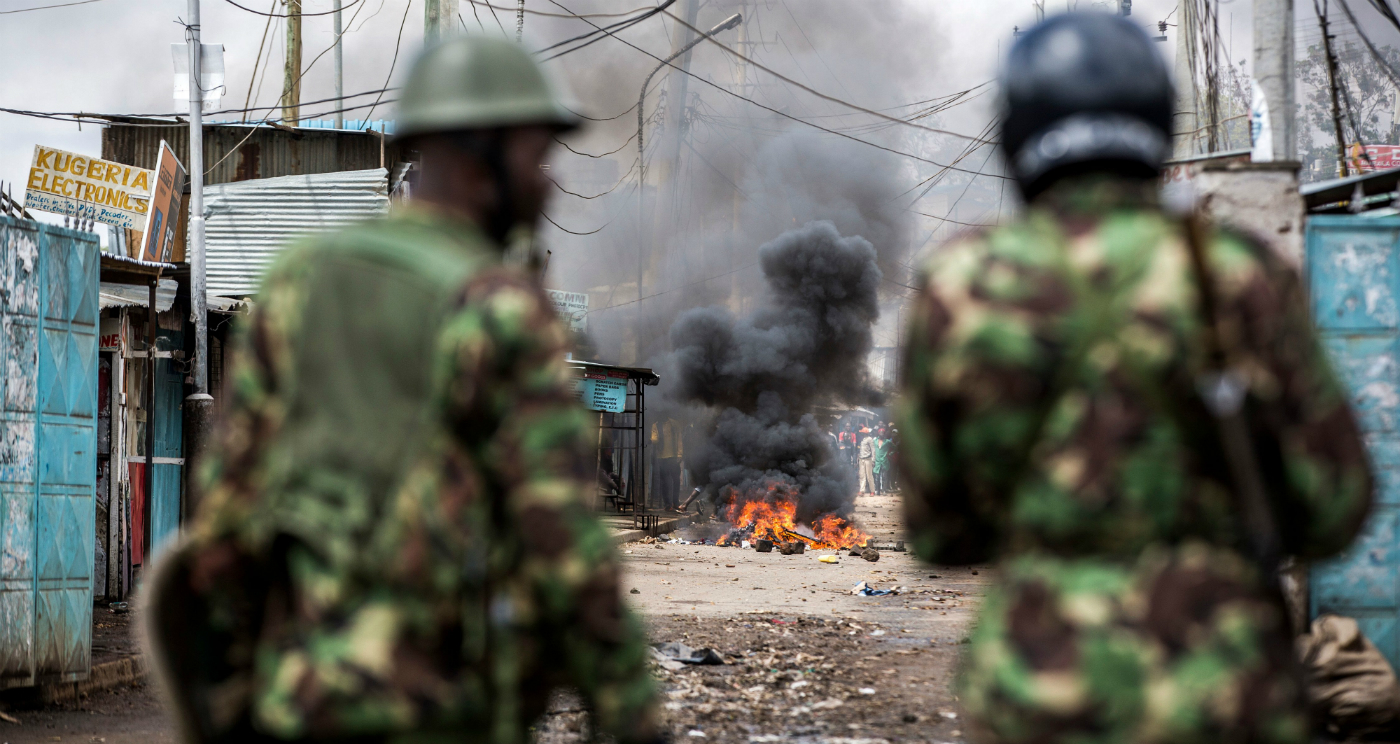Kenya election: shootings, fires and bloody clashes mar presidential vote
Fears victory for incumbent leader Uhuru Kenyatta will trigger more violence and legal challenges

A free daily email with the biggest news stories of the day – and the best features from TheWeek.com
You are now subscribed
Your newsletter sign-up was successful
The election rerun in Kenya today appears almost certain to end in victory for the incumbent president, Uhuru Kenyatta, who campaigned without a credible challenger after opposition leader Raila Odinga withdrew from the contest over alleged voting irregularities in the previous poll.
None of the six other minor candidates received more than 1% in the August election, according to Al Jazeera English.
But while Kenyatta’s victory is all but assured, the matter will not end there. The Kenyan Electoral Commission has already said it can’t guarantee a credible vote, and Odinga has urged voters to boycott polling stations.
The Week
Escape your echo chamber. Get the facts behind the news, plus analysis from multiple perspectives.

Sign up for The Week's Free Newsletters
From our morning news briefing to a weekly Good News Newsletter, get the best of The Week delivered directly to your inbox.
From our morning news briefing to a weekly Good News Newsletter, get the best of The Week delivered directly to your inbox.
“In stark contrast to the first ballot in August, which was overturned by the Supreme Court, several polling stations in key areas stood empty or welcomed only a handful of voters in an election likely to face more legal battles,” says the News24 website.
Opposition supporters clashed with police earlier today and threw up burning barricades in pockets of the country in a bid to derail the election, Reuters reports.
Within hours of polling stations opening, the first election-related shooting death was confirmed in the western town of Kisumu, where, according to CNN, police used tear gas and water cannons on protesters. At least four people were admitted to hospital with bullet wounds, along with more than a dozen who had been beaten by police.
Human rights groups claim that security forces killed at least 67 people during protests following the August vote, says The Washington Post. Kenyan authorities claim the death toll was lower.
A free daily email with the biggest news stories of the day – and the best features from TheWeek.com
The BBC’s Africa editor, Fergal Keane, says today’s election rerun has “implications not only for the country but also for much of the continent”. Keane praises the Supreme Court’s decision to annul the August elections, and calls Kenya’s Chief Justice, David Maraga, a “man of great courage”.
A last-minute petition by the Supreme Court to postpone today’s vote failed after the court was unable to gather a quorum of judges to hear the case. The deputy chief justice was unavailable after her bodyguard and driver was shot, an incident many Kenyans saw as intimidation of the judiciary, ABC News reports.
“Whether the court has now backed off or been frightened off, what could have been a huge advance for democracy in Kenya - and by extension, Africa as a whole - could end up setting the clock back,” writes David Pilling, the Africa editor of the Financial Times.
-
 ‘Restaurateurs have become millionaires’
‘Restaurateurs have become millionaires’Instant Opinion Opinion, comment and editorials of the day
-
 Earth is rapidly approaching a ‘hothouse’ trajectory of warming
Earth is rapidly approaching a ‘hothouse’ trajectory of warmingThe explainer It may become impossible to fix
-
 Health insurance: Premiums soar as ACA subsidies end
Health insurance: Premiums soar as ACA subsidies endFeature 1.4 million people have dropped coverage
-
 Epstein files topple law CEO, roil UK government
Epstein files topple law CEO, roil UK governmentSpeed Read Peter Mandelson, Britain’s former ambassador to the US, is caught up in the scandal
-
 Iran and US prepare to meet after skirmishes
Iran and US prepare to meet after skirmishesSpeed Read The incident comes amid heightened tensions in the Middle East
-
 Israel retrieves final hostage’s body from Gaza
Israel retrieves final hostage’s body from GazaSpeed Read The 24-year-old police officer was killed during the initial Hamas attack
-
 China’s Xi targets top general in growing purge
China’s Xi targets top general in growing purgeSpeed Read Zhang Youxia is being investigated over ‘grave violations’ of the law
-
 Panama and Canada are negotiating over a crucial copper mine
Panama and Canada are negotiating over a crucial copper mineIn the Spotlight Panama is set to make a final decision on the mine this summer
-
 Why Greenland’s natural resources are nearly impossible to mine
Why Greenland’s natural resources are nearly impossible to mineThe Explainer The country’s natural landscape makes the task extremely difficult
-
 Iran cuts internet as protests escalate
Iran cuts internet as protests escalateSpeed Reada Government buildings across the country have been set on fire
-
 US nabs ‘shadow’ tanker claimed by Russia
US nabs ‘shadow’ tanker claimed by RussiaSpeed Read The ship was one of two vessels seized by the US military